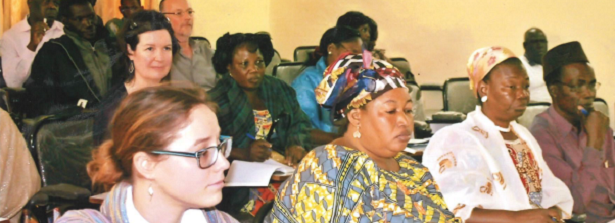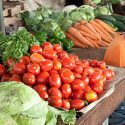Bridging gaps between women food entrepreneurs and urban policy & business instruments

On February 2, 2017 in Ouagadougou, the research project team “Building Inclusive Business Models for Women Food Entrepreneurs” organized a stakeholder workshop, with representatives of women food entrepreneurs (WFEs) and the urban policy and business sector present. The meeting was hosted by l’Institute de Récherche Scientifique de la Santé (IRSS), presided by Prof Sylvin Ouedraogo.
Although urban policies, initiatives and instruments for promoting food entrepreneurship are in place, from the interaction with the WFEs we learned that, despite multiple business activities, time and resource constraints undermine adding-value to food commodities and business professionalization and upscaling. The issue for WFEs is particularly relational due to the lack of collaborations and gender-aware products and services.
Challenges
The food value chains in the city and beyond are not well structured from the perspective of WFEs. They operate in typically very short food value chains, which matches their small span of control over productive resources, including their own labour time. Resources, space and affordable innovative technology to process, package and market off-season crops are limited, but in high demand by WFEs. Access to good roads and transportation means is also a challenge for WFEs. Combining household chores with commercial activities puts limits on women’s time and mobility. Farming on marginal land in a growing city such as Ouagadougou also brings pollution problems (polluted soils and water e.g. by plastic bags and waste), rapid drying of the water reservoirs and landslide problems due to the silting up of the reservoirs. Land access can be insecure and under the stress of urban development and growth.
Financing
Financial products specifically geared towards WFEs, accommodating social collateral, seasonal pay-back schedules and small loans, are currently few or unknown by the WFEs. Microcredit is offered by the NGO Afrique Verte, allowing women’s groups to arrange for social collateral to obtain credit at the Caisse Populaire bank, and by the Ministry of Agriculture through the Kuwaiti fund (2,500 million) managed by a local bank (CORIS Bank). The WFEs present were unaware of these arrangements. Bank loans and government subsidies follow the standard entrepreneurial model communication routes and fail to reach the WFEs.
Opportunities
Selling fresh legumes straight from the garden to visiting buyers gives them the advantage of limited costs (for instance, costs of packaging, transportation and women’s opportunity costs of time), but also low profit margins. Linking up to international markets, such as Europe, is risky for WFEs because they produce at such small scale, irregularly and of varying quality.
Representatives from the Pissy quarry were invited to discuss the potential commercialization of biotite from granite rock dust, which is currently a waste product (see Geological Survey), in order to enrich nutrients in urban soils. This could improve soil and crop quality and production in an ecologically sustainable way, and at low cost. A positive spillover effect could be realized if the extra income accrues to the (mostly) female mineworkers.
The stakeholder meeting highlighted the, on average, low added-value generated by WFEs. Positive exceptions had found a niche product or market, by means of innovative food commodities or recipes (e.g. couscous with dried vegetables and meat) combined with a small amount of start-up capital. More breakthroughs in the form of innovative structures, collaborations and gender-aware products and services in and around the urban food chain are needed to elevate the WFEs’ performance and success.
Please download the complete report of the stakeholder meeting (PDF).






